Zero Waste Gardening
What is it?
Everyone committing to reducing or stopping bringing inorganic objects to the gardens. There might be exceptions like water barrels.
Everyone dealing with the waste products they create or have on their plots by themselves or collectively ie. don't put piles of couch grass or weeds from your plot into a big community dumping area.
Everyone consciously re-thinking what is a waste product and what can be re-used or re-purposed. What are you going to do with old pallets on your plot once they have become rotten?
We could all be mindful of bringing into the gardens materials that don't have a specific purpose even if we think they could be re-used. Sometimes we are offered things and, although we have good intentions for re-using them, bring them to the gardens without discussing with others or having a clear understanding that they might not be fit for the purpose we one day might think they will be used for.
Why should we?
Part of the community gardens' constitution has an objective: "encouragement of zero waste gardening".
The community gardens could be an example to community, how to live not only sustainably but also regeneratively - to make things better than we've found them. Currently, however, we are as unsustainable as the rest of society exporting waste from our plots for the gardens' community to then deal with. Invariably this means paying for expensive skip removal to landfill. Your membership donations are better spent on more productive needs. We could all do better.
What You Could Do:
- Barrels with lids filled with water for weeds on your plot creates an anaerobic digester. This creates liquid fertiliser. You bucket out the nutrient rich water onto your plot. Empty the bin as required if it becomes full of organic matter. The perfect way to deal with couch grass.
- People could compost their "weeds". What even is a weed? Arguably, what you actually want in your compost heap.
- Remove weeds prior to them going to seed. That way you could compost them on your plot without adding to the seed bank on your plot and in your compost.
- You could have multiple compost bins on your plot. If you don't, then you could start allocating space now and to deal with future demands.
- Ongoing education to not bring non-compostable objects into the gardens
- Pallet waste - could take it home from your plot with you and put it in your rubbish. Could bury it to rot down on your plot.
- You could always take your own waste home in your car and put it in your home bin. You could take a little bit of waste every time you leave the gardens
Don't:
- Don't export the fertility from your plot by leaving all the best soil you have wrapped around the roots of weeds when you dump them away from your plot. Take the time to get all the soil off. (See an example of what not to do in the photos below)
- Don't dump your weeds ie. clumps of grass, when you could compost them. If the grass does not have rhizomes like couch grass or tap roots like dock, then grass will quickly breakdown in your compost.
- Don't be like these people (below photo) who have removed the best soil from their plot to the community green waste drop off area with their weeds. This area should only be for really, really difficult to compost green waste ie. branches. Arguably, it shouldn't be here at all. Let's work together and no add to this unnecessary pile that will cost others time and effort to (re)move.
Photo examples of unnecessary dumping of fertile soil and weeds that could have been composted on individual plots:


